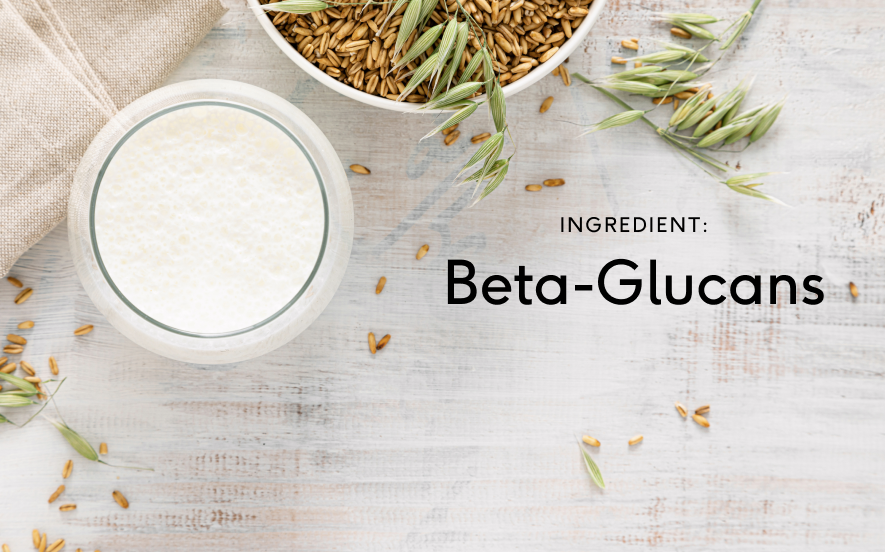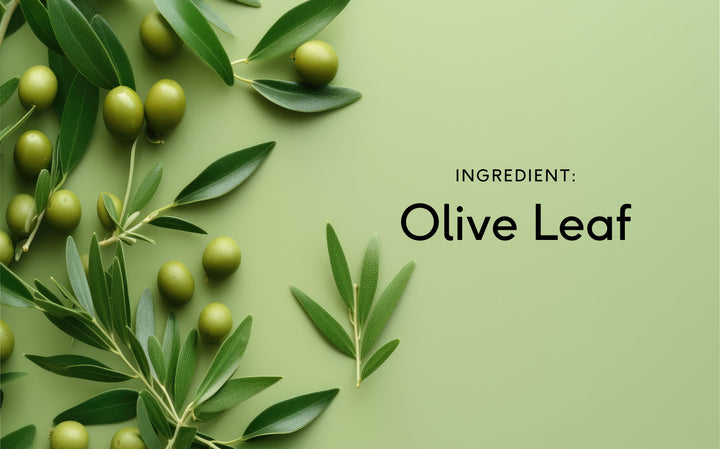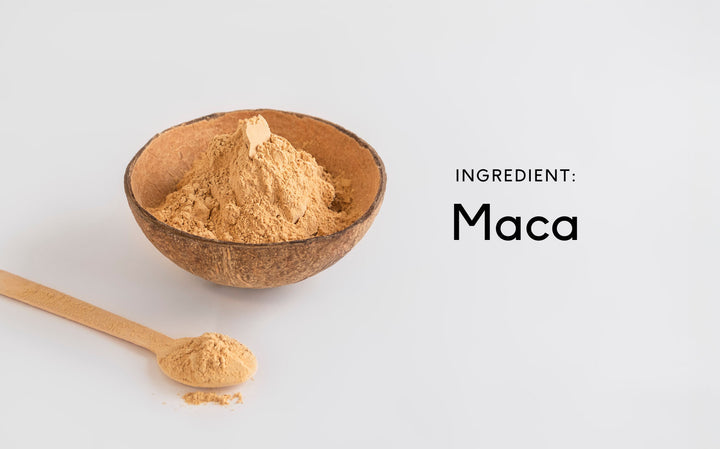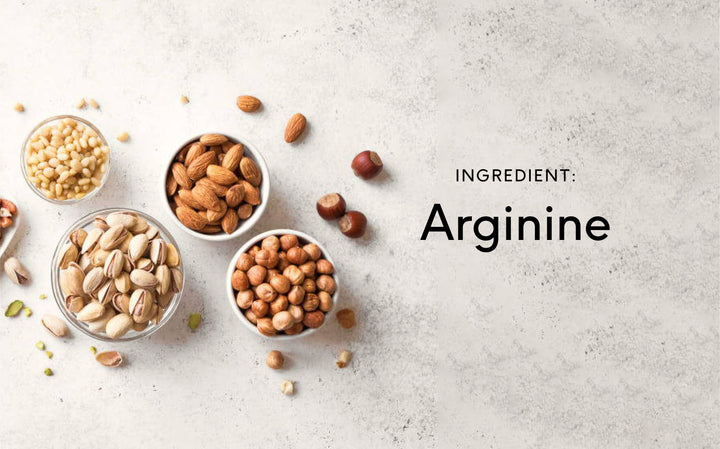Learn About Beta-Glucans in 5 Minutes
Table of contents

What are beta-glucans?
Beta-glucans are beneficial sugars called polysaccharides that form in the cell walls of certain types of fungi and bacteria. There are quite a few different types of these polysaccharides, but the 1,3/1,6 beta-glucans used by Feel are derived from Saccharomyces cerevisiae, which is the scientific name for brewer’s yeast.
As a form of soluble fibre, beta-glucans improve digestion and help your body absorb carbohydrates at a healthy pace. In addition, contemporary research suggests that beta-glucans may be beneficial to your cardiovascular, metabolic, and immune health.
Are beta-glucans water-soluble or fat-soluble?
Beta-glucans are water-soluble, which means that they break down in your body’s aqueous fluids.
Where can beta-glucans be found naturally? Common sources of beta-glucan:
Beta-glucans are found in most types of yeast, beneficial bacteria, and mushrooms. These beneficial sugars are also present in oats.
What is the recommended daily value for beta-glucans?
While these substances appear to be highly beneficial, 1,3/1,6 beta-glucans have not been recognised as essential nutrients. In clinical studies, however, beta-glucan doses between 100-500mg have been used.
Can you absorb enough beta-glucans from food?
Unless you consume oats, brewer’s yeast, or mushrooms every day, consuming beta-glucans in food can be challenging. In addition, these foods generally contain very low levels of beta-glucans, and these beneficial sugars have reduced bioavailability in food.
Why are beta-glucans necessary for your body?
As a type of dietary fibre, beta-glucans seem to help your body digest food efficiently, which improves your energy levels and general well-being. Specifically, however, beta-glucans appear to regulate the rate at which your body absorbs glucose from food, which could potentially make these healthy sugars helpful for people with diabetes or other metabolic conditions.
Functions of beta-glucans
- Potential digestive benefits: Beta-glucans appear to reduce the rate at which glucose is absorbed during digestion and delivered into your bloodstream, which could prevent blood sugar spikes and subsequent crashes.
- Potential cardiovascular benefits: Research indicates that beta-glucans may reduce levels of bad cholesterol. Beta-glucans do not, however, appear to lower levels of beneficial cholesterol.
- Potential metabolic benefits: By reducing the rate at which glucose is absorbed via your digestive tract, beta-glucans appear to reduce blood glucose levels in diabetic patients. Research suggests that these reduced blood glucose levels ameliorate the cardiovascular risks associated with diabetes.
- Potential weight loss benefits: In addition to potentially helping with diabetes, research suggests that beta-glucans may also help obese individuals lose weight.
- Potential immune benefits: Preliminary research suggests that beta-glucans may act as immunostimulants, which means these natural substances could help your body fight disease.
With their immunostimulating properties, Beta-Glucans are the perfect ingredient to support the immune system, which is why we've included 300mg of Beta-Glucans in Feel Immunity.
When should you take beta-glucans?
If you have type 2 diabetes, beta-glucans could significantly improve the rate at which your body absorbs glucose, which would reduce your blood sugar levels and make it easier for insulin to perform its critical task. Obesity is often comorbid with diabetes, and taking beta-glucans also appears to be a good idea if you’re trying to lose weight. Regardless of your current health status, beta-glucans appear to offer potent digestive, cardiovascular, and immune benefits that could improve your longevity and overall well-being.
How long do you need to take beta-glucans to start experiencing their benefits?
Beta-glucans do not need to be absorbed into your body tissues to function, so the benefits of these healthy sugars may kick in almost immediately.
Consistency is key and our research recommends you take your Feel supplements for at least 3 months to allow your body to adjust and provide you with the desired benefits.
How long does it take for your body to digest/absorb beta-glucans?
Beta-glucans rapidly adhere to the walls of your digestive tract instead of absorbing into your tissues.
How long do beta-glucans stay in your body after you take them?
Research indicates that beta-glucans remain in your digestive tract for a few days before flushing out.
Are beta-glucans antioxidants?
Beta-glucans do not appear to exert direct antioxidant activity. However, these sugars appear to support the function of antioxidant systems throughout your body, which means that beta-glucans may act as indirect antioxidants.
Can you overdose on beta-glucans? What are the effects?
Beta-glucans have low toxicity and do not appear to have any significant side effects. Research indicates, however, that taking large doses of beta-glucans does not improve their beneficial effects.
Do beta-glucans dissolve, flush out, or build up in the body?
Beta-glucans build up in the digestive tract for a few days before they flush out of your body.
Can you take beta-glucans during a diet?
Beta-glucans appear to improve your digestion and help you lose weight, which makes these beneficial sugars ideal supplements to take while dieting. In addition, beta-glucans are non-GMO, vegan, gluten-free, and cruelty-free.
Are there synthetic forms of beta-glucans?
In 2013, Chinese scientists synthesised a form of beta-glucan as part of a study into this substance’s immunomodulatory effects. To date, however, it does not appear that there have been any efforts to market synthetic beta-glucans to consumers.
Absorption rate of synthetic beta-glucans
The Chinese study referenced above did not provide any data on the bioavailability of synthetic beta-glucans, and no other data are available on this subject.
Why might natural forms of beta-glucans be better?
Natural beta-glucans are the only types of these substances currently available to consumers.
How to take beta-glucans
Beta-glucans can be consumed in certain forms of food, and these beneficial sugars can also be ingested in oral supplements.
Beta-glucans trends in medicine
In 2020, a study was published indicating that beta-glucans may be useful in attenuating your circadian rhythm during seasonal light shifts, which is promising news for anyone who suffers from seasonal affective disorder (SAD). Also this year, a scientific review indicated that there is ample evidence of beta-glucans reducing the blood glucose spike that commonly occurs after meals, which further indicates that these healthy sugars could be highly useful for people with diabetes.
Sources
1. Beta-glucans in higher fungi and their health effects
2. Cholesterol-lowering effects of oat β-glucan
3. Cholesterol-lowering effects of oat β-glucan: a meta-analysis of randomized controlled trials
4. Effect of Beta-Glucans in the Control of Blood Glucose Levels of Diabetic Patients: A Systematic Review
5. Beta-glucans in the treatment of diabetes and associated cardiovascular risks
6. Beta Glucan: Health Benefits in Obesity and Metabolic Syndrome
7. Beta-glucans as immunostimulant in vertebrates and invertebrates
8. Prebiotic supplementation (beta-glucan and inulin) attenuates circadian misalignment induced by shifted light-dark cycle in mice by modulating circadian gene expression
9. Oat Beta-Glucan and Postprandial Blood Glucose Regulation: A Systematic Review and Meta-Analysis of Acute, Single-Meal Feeding, Controlled Trials













































 Back
Back





